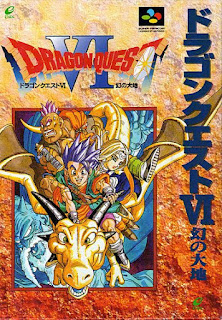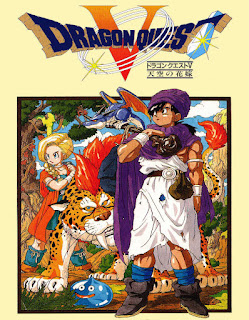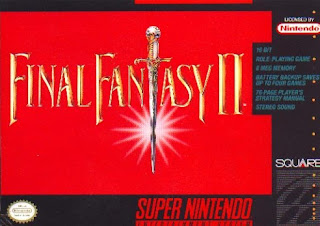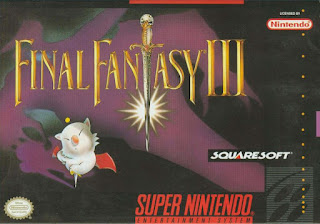12. Final Fantasy II (Famicom)
The black sheep of the series, FF2 is underappreciated. This is the only Final Fantasy game to eschew classes and XP, with skills leveling up as you use individual spells and weapon types. Unfortunately, this system is broken, especially for magic spells, which level up too slowly, but it works better than people usually give it credit for. It's only in retrospect that it seems so flawed. Infamously, you can attack your own party members to gain HP, but this is neither necessary nor fun. This is also the first Final Fantasy to have characters (some of whom come and go) instead of blank slates. The plot is not about Crystals, but rather a generic struggle between empire and rebellion. The game also uses a unique keyword system, in which you memorize certain terms and then repeat them to certain characters to advance the story.
A fully-translated English prototype was made, but it went unreleased due to the SNES already being out. A fan translation brought this to the West in 1998, and an excellent remake on the PlayStation came out in 2003 bundled with a remake of the original. This was shortly followed by the Dawn of Souls compilation on Game Boy Advance.
11. Dragon Warrior II (NES)
The black sheep of the Dragon Quest series (renamed Dragon Warrior in the West due to a now-defunct trademark), DW2 is grindy and not very fun. You assume the roles of three descendents of the hero of DW1 and the princess. You can even visit the descendent of the Dragonlord, who is a nice guy, it turns out. The world is larger, and lands are connected via an ocean you sail. Getting access to two more characters compared to the original is nice, but they are frustratingly underpowered. In the U.S. this came out after Final Fantasy and thus seemed primitive.
10. Dragon Warrior (NES)
Dragon Warrior birthed the entire JRPG video-game genre. As such, it's very primitive and grindy
af, but it has a place in the heart of everyone who got hooked on RPGs after getting a free copy of Dragon Warrior for subscribing to Nintendo Power! If you take away the excessive grinding (as in the Game Boy Color and Switch remakes), the game is very short. The whole game takes place in the kingdom of Alefgard. It's basically a series of fetch quests that culminate in entering the Dragonlord's castle to kill him. In fact, if you already know where to find the Mark of Erdrick, you don't even need to save the princess from the green dragon.
9. Final Fantasy (NES)
It pains me to see modern players dump on the original Final Fantasy. This game was excellent for its time, even if it came to the U.S. rather late (1990). It's a straight-up 8-bit rip-off of D&D, and it succeeds brilliantly. You choose the classes for your four Light Warriors, each of whom carries a mysterious ORB (Crystal) they must re-light in order to restore balance to the four elements. And there's some nonsense about a time loop.
Like the aforementioned games, FF1 is grindy, but it's more fun if you push ahead into dungeons, then strategically retreat when needed, instead of spending hours fighting Ogres on the world map. I've played the whole game this way and can assure you it can be done. Also, don't buy the Silver (Mythril) Sword in Elfheim; it wasn't supposed to be there (the remakes remove it), and the game is better without wasting hours grinding for 4,000 gold to get an OP sword. This game is such a classic, and it gave us hilarious spell names like FIR3 and XFER (which doesn't even work due to one of many programming bugs).
8. Final Fantasy III (Famicom)
Tragically unreleased in the West because the Super Nintendo was already out, FF3 was included on the Famicom Mini in Japan in lieu of FF1 because it's much more advanced. It takes everything great about the original and does it better. Notably, your characters (four orphans chosen to be the Warriors of Light) can change jobs whenever you want by spending job points you earn in battle along with XP. The plot brings back the elemental Crystals, but with four additional Dark Crystals and Dark Warriors.
A fan translation made this game available to the English emulation community in 1999. The Pixel Remaster series finally brought this to the West last year, with some class rebalancing and audio-visual upgrades. Prior to that, we only had the 3D Remake that debuted on the DS in 2006.
7. Final Fantasy V (Super Famicom)
Final Fantasy V is basically a Super Famicom version of FF3, with a more expansive job system and a similar plot about darkness taking over the world. Interestingly, mid-game one of the main characters dies and transfers all his skills to his granddaughter! Perhaps because of its classic JPRG nature when compared to the story- and character-driven IV and VI—
and of course because it was skipped in the West—it doesn't rank as highly compared to its SNES brethren. A fan translation came out in 1998, and in 1999 it got an official English release on PlayStation alongside VI under the title
Final Fantasy Anthology. It later came to Game Boy Advance with a better translation and some post-game bonus jobs.
6. Dragon Quest VI (Super Famicom)
For some reason the Dragon Quest series has never caught on in the West the way it has in Japan, where it is more popular than Final Fantasy. As a result, we didn't get Dragon Quest V or VI on the SNES. Fortunately, high-quality remakes came out on the DS in 2009 and 2011, respectively. The sixth title isn't as adored as the fifth (in part because it has fewer monsters to recruit), but it's still a great game, in which you travel between the regular world and a parallel dream world. One can only lament its absence on the SNES.
5. Dragon Warrior III (NES)
Dragon Warrior III is an absolute classic. It's similar to the first Final Fantasy in that you generate your own party, however you like, but even better because you can make new party members and swap them out whenever you want. An unexpected plot development near the end of the game sends you to Alefgard, where you discover that you are the legendary hero Erdrick! I'm looking forward to the HD-2D remake being made for Switch.
4. Dragon Warrior IV (NES)
Dragon Warrior IV came out late in the NES's lifespan, in the fall of 1992. It started a new trilogy of stories centered on a castle in the sky called Zenithia. Uniquely, the game is broken down into five chapters; in the first four you play various characters, and then in chapter 5 you play the hero, who meets these characters, and they join his party. You choose three of them (plus the hero) as your main party, while everyone else rides around in a horse-drawn wagon. You can swap characters in and out of battles whenever you choose. If the active party is wiped out, the wagon-riders pop out and keep fighting! Interestingly, in chapter 5 you control only the hero, selecting an AI strategy for your other characters. In the excellent DS remake, you have the option to control each character manually.
3. Dragon Quest V (Super Famicom)
Usually considered the best DQ game, I remember reading a letter to the editor in Nintendo Power, in which an older player fervently hoped this game would come to the U.S. before he died! What's so cool about DQ5 is that you play through three generations. You begin by controlling the hero and his father, then the story advances and he is grown-up. You get to choose between two different female characters for him to marry (a shrewish third option is added in the DS remake), and then in the final part of the game they have children, who also join the party! The game is also notable for the many monsters you can recruit into your party.
It's sad the Dragon Warrior games did so poorly in the U.S. that Enix had to close up shop. Thank God Square (maker of Final Fantasy) bought Enix, then revived the DQ series on the DS and 3DS! I wonder if the man who wrote to Nintendo Power ever got to play this...
You knew where this list was going, didn't you? Final Fantasy II (as we knew it) was one of my favorite games as a kid. If the Dragon Warrior series got me hooked, it was Final Fantasy II that solidified me as a lifelong JPRG player. The story, to be honest, is ridiculous, with all kinds of fake deaths and clichés. Yet Cecil's epic quest to the moon to discover his true nature and defeat the villainous Golbez (or is he?!) still holds up. It's the colorful cast of characters where the game shines.
This game is such a legend that Square made a 3D Remake for the DS (in 2008), even though they'd already put out a GBA version three years earlier. I prefer the 2D version, but the more FF4, the merrier! Indeed, the new Pixel Remaster versions of this and all the FF games are outstanding, not least because of their orchestral soundtracks.
1. Final Fantasy VI (SNES)
Here we are, the best of the best. Final Fantasy VI (aka III) is jam-packed with cool stuff: Espers, the Colosseum, Magitek armor, Kefka, the World of Ruin. This is without a doubt the pinacle of 16-bit JPRGs (although there is Chrono Trigger...). It was the first Final Fantasy game to introduce mini-quests, such as remembering the lyrics to an opera or talking to dinner guests in order to score etiquette points. Each character has a unique set of abilities, such as Sabin's Street-Fighter-style karate moves. There are a couple hidden characters, you can lose one character permanently (and I did!), relics let you enhance your characters, and anyone can learn any magic spell by equipping the appropriate Esper and fighting enough battles with it. And you can use the Espers as Summons!
After the world is plunged into darkness by the mad clown Kefka, the game becomes non-linear, as you fly around in Setzer's airship re-gathering everyone. At that point, you can choose whomever you want in your party. The final dungeon requires you to use everyone, breaking them into three groups exploring different sections. The final boss fight, set to Nobuo Uematsu's memorable song "Dancing Mad," involves a tower of grotesques, atop which sits a divinized Kefka. FF6 has it all, and you can play the Pixel Remaster version now, or boot up your old Super Nintendo or Game Boy Advance.
Thanks for reading! How do you rank these games?













Comments
Post a Comment